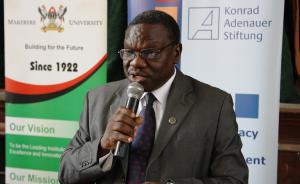Introduction
With the referendum of 2005 Uganda joined several countries around the world that are governed under a multiparty system. Thus, a fundamental pre-requisite for genuine democracy had been set. The opening of political space guarantees Ugandans the basic freedom to form, associate and interact within political parties and to compete for political power through them. Indeed, the legal-constitutional framework offers the different parties the opportunity to participate fully in the country’s democratisation as well as socio-economic development processes.
But the legal existence of multipartyism alone can not be a sufficient indicator of democratic governance. A number of significant factors within the pluralistic system are crucial in determining whether a society is being democratically governed and if at all the multiparty system itself will be consolidated and sustained. In Uganda, it is clear that multiparty politics is still at its nascent stage – barely six years by the year 2011. Although there are some registered achievements a number of challenges are still noticeable. It is this latter point that greatly informed the author’s desire to publish this book on Multiparty Politics in Uganda. The book examines the evolving scenarios within several crucial areas of political governance, namely: decentralisation; ethnicity and religion; campaigning; elections management; political parties; parliament; and “other actors” in the democratisation process.
This publication offers useful insights upon which the country can certainly build on to embed greater democracy. Through the conceptual framework of hybrid regimes, it clearly analyses the critical challenges that lie ahead in nurturing multiparty politics. The analysis based on different theoretical and conceptual contexts in the respective chapters that also borrow from several parts of the world and other distinguished scholars gives the book its academic strength. In fact, in each of the chapters, the book does not shy away from suggesting concrete remedies to the challenges brougt about by multiparty politics. It is my considered opinion that resolving the challenges that it clearly identifies and implementing the recommendations suggested will demand effective participation of all – state and non state actors.
I find the author of this book, Associate Professor Yasin Olum (PhD), one of the finest intellectual and academic minds Uganda has produced. I have had occasion to work with him on several projects as a consultant for the Konrad-Adenauer-Stiftung (KAS). Then, I found him to be hard working and an expert diligently committed to the topic of democratisation. In deciding to support this publication KAS was confident it would meet two important criteria: first is that it addresses the crucially important topic of democracy; and second, the expert tasked with its delivery has the necessary knowledge and experience of several years about the Ugandan system and democratic frameworks elsewhere in the world. He has ably presented a detailed analysis of Uganda’s political situation with highly enriching comparisons from other systems. Perhaps one of the appealing aspects of this book is the fact that it is written by a Ugandan citizen who has experienced all governance systems Ugandan has gone through, including the colonial era and post colonial eras.
It is my sincere hope that this book will go a long way in contributing to the contemporary political debates surrounding the new multiparty political dispensation. I encourage the scientific community to read it and to reflect deeply on its contents. There is a lot here that we can tap on to build full-blown multiparty politics and practice genuine democracy.
You can download the whole report as pdf.
About this series
The series analyses developmental challenges in the political, social and economic sphere in Uganda. The editions examine hot topics of the daily political agenda and undertake a rigorous reality check. Reality Check is published in cooperation with Centre for Development Alternatives.
Order details
Editor
Konrad-Adenauer-Stiftung e. V.
ISBN
978-9970-153




